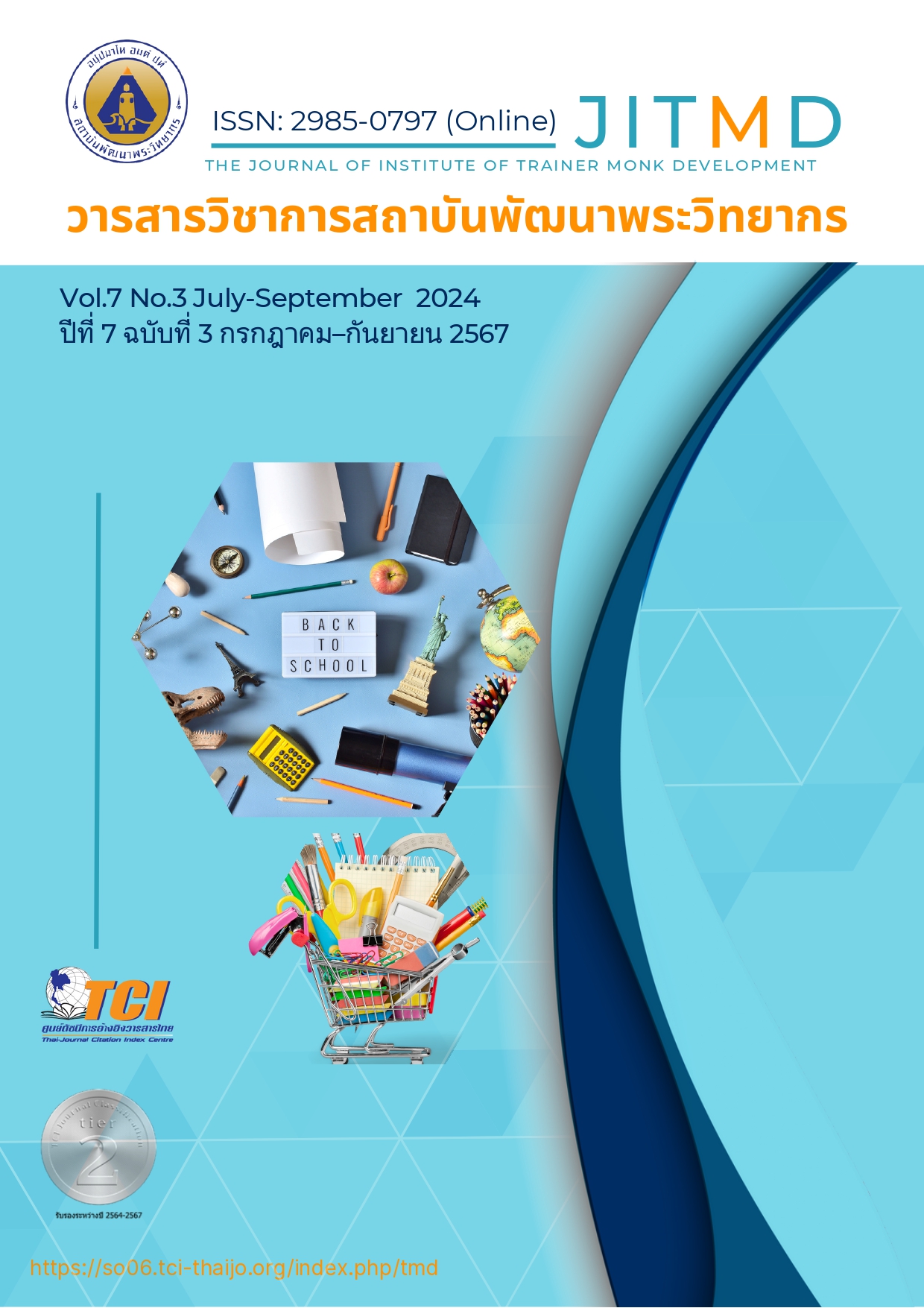The Development of Extra-Curricular Activities on Sila at the Basic Education Level
Main Article Content
Abstract
This research aims to 1) develop Sila extracurricular activities at the basic education level. 2) to compare academic achievement before and after studying using Sila extracurricular activities at the basic education level. Grade 6, and 3) to assess the satisfaction of Grade 6 students at Ban ThaMuang School, towards Sila extracurricular activities at the basic education level. The target groups used in the research were 1) the head of the Sila performance group, 2) the school board of BanThaMuang, 3) the director of Ban ThaMuang School, 4) the head of the department of BanThaMuang School, and 5) the parents of students at BanThaMuang School. A total of 15 people and students studying at BanThaMuang School. Grade 6, 20 people. The research method is divided into 3 phases. Phase 1 study of basic data. Needs or needs and the development of the curriculum. Phase 2 studying the results of the curriculum trial. Divided into 2 parts. The first part: the curriculum (before use) is an experiment with a non-sample group. The second part: the curriculum (after use) is Experiment with a real sample group in order to use the information obtained to improve the curriculum and use the resulting curriculum to evaluate and further develop it, and Phase 3 studies student satisfaction. The research results found that: 1) Extra-curricular activities on Sila consisting of principles, objectives, learning management. Measurement and evaluation Learning outcomes and learning management plans. 2) The academic achievement of students has a higher mean score after studying than before studying, with statistical significance at the .05 level. 3) Overall student satisfaction assessment results are at the highest level.
Article Details

This work is licensed under a Creative Commons Attribution-NonCommercial-NoDerivatives 4.0 International License.
บทความที่ได้รับการตีพิมพ์เป็นลิขสิทธิ์ของวารสารวิชาการสถาบันพัฒนาพระวิทยากร
ข้อความที่ปรากฎอยู่ในบทความที่ได้รับการตีพิมพ์ในวารสาร ถือเป็นความรับผิดชอบของผู้เขียนบทความ และข้อคิดเห็นนั้นไม่ถือว่าเป็นทัศนะและความรับผิดชอบของกองบรรณาธิการวารสารวิชาการสถาบันพัฒนาพระวิทยากร
References
กระทรวงศึกษาธิการ. (2559). หลักเกณฑ์และแนวทางการคัดเลือกบุคคล หน่วยงาน สถานศึกษา ผลงานดีเด่น รางวัล MOE AWARDS กระทรวงศึกษาธิการ ประจำปีการศึกษา 2559. กรุงทพฯ: สำนักส่งเสริมกิจการศึกษา สำนักงานปลัดกระทรวงศึกษาธิการ.
งามตา เพชรคอน. (2549). การพัฒนาหลักสูตรการอนุรักษ์ท้องถิ่นเรื่องผักพื้นบ้านสำหรับนักเรียน ในช่วงชั้นที่ 2 ในโรงเรียนสังกัดสำนักงานเขตพื้นที่การศึกษาสุพรรณบุรีเขต 3. วิทยานิพนธ์ ปริญญาครุศาสตรมหาบัณฑิต สาขาวิชาหลักสูตรและการสอน. คณะครุศาสตร์ มหาวิทยาลัยราชภัฏเทพสตรี.
จิราภรณ์ พรมสืบ. (2559). การศึกษาผลสัมฤทธิ์ทางการเรียนและความพึงพอใจของนักเรียนชั้นมัธยมศึกษาปีที่ 1 ด้วยการจัดกิจกรรมการเรียนรู้แบบร่วมมือโดยเทคนิคแบ่งกลุ่มคละ ผลสัมฤทธิ์ (STAD) รายวิชาวิทยาศาสตร์หน่วยการเรียนรู้เรื่อง สารละลายกรดและเบส. วิทยานิพนธ์ วท.ม. มหาวิทยาลัยบูรพา.
ชาดา กลิ่นเจริญ และจารุชา ธนิศาเดชาภัค. (2553). การพัฒนาหลักสูตรฝึกอบรมการทำผ้าลายเขียน เทียน สำหรับนักเรียนชั้นประถมศึกษาปีที่ 6. วารสารศึกษาศาสตร์มหาวิทยาลัยนเรศวร, 12(3): 133-138.
ธำรง บัวศรี. (2542). ทฤษฎีหลกัสูตรการออกแบบและพัฒนา. (พิมพ์ครั้งที่ 4). กรุงเทพฯ: โรงพิมพ์คุรุสภาลาดพร้าว.
ปวิชญา เนียมคำ. (2558). การพัฒนาหลักสูตรมรดกภูมิปัญญาทางวัฒนธรรมหนังใหญ่วัดสว่างอารมณ์ กลุ่มสาระการเรียนรู้ศิลปะ สำหรับนักเรียนชั้นมัธยมศึกษาปีที่ 5. วิทยานิพนธ์ครุศาสตรมหาบัณฑิต สาขาวิชาหลักสูตรและการสอน. มหาวิทยาลัยราชภัฏเทพสตรี.
วารี มะลิทอง. (2550). การพฒนาหลักสูตรประเพณีท้องถิ่น กลุ่มสาระการเรียนรู้ภาษาต่างประเทศสำหรับนักเรียนชั้นประถมศึกษาปีที่ 6. วิทยานิพนธ์ปริญญาครุศาสตรมหาบัณฑิต สาขาวิชาหลักสูตรและการสอน. คณะครุศาสตร์ มหาวิทยาลัยราชภัฏเทพสตรี.
ลิสา ศรีไพล และคณะ. (2550). หลักสูตรท้องถิ่นเรื่อง การจัดกระบวนการเรียนรู้การทำมาหากิน ของชุมชนในพื้นที่ป่าบุ่ง-ป่าทาม กรณีศึกษา: โรงเรียนบ้านเพียมาต (รัฐราษฎร์พิทยาคาร) ตำบลหนองแค อำเภอราศีไศล จังหวัดศรีสะเกษ. รายงานการวิจัย. สำนักงานกองทุนสนับสนุนการวิจัย (สกว.) ฝ่ายวิจัยเพื่อท้องถิ่น.
สุดใจ รอดสุวรรณ. (2549). การพัฒนาหลักสูตร เรื่องพืชสมุนไพรในท้องถิ่น กลุ่มสาระการเรียนรู้การงานอาชีพและเทคโนโลยี สำหรับนักเรียนชั้นมัธยมศึกษาปีที่ 1 สังกัดสำนักงานเขตพื้นที่การศึกษา ลพบุรี เขต 2. วิทยานิพนธ์ปริญญาครุศาสตรมหาบัณฑิต สาขาวิชาหลักสูตรและการสอน. คณะครุศาสตร์มหาวิทยาลัยราชภัฏเทพสตรี.


